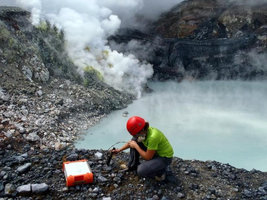Conditions of the Lake at the Poas Volcano in Costa Rica Allow for Investigation on Life in Mars5/6/2018  The lake at the Poas Volcano National Park has drawn the attention of scientists and investigators that believe its extreme conditions could offer information about life in Mars. According to Guillermo Alvarado, geologist of the National Seismology Network (RSN), the characteristics of the lake make it almost impossible for there to be any form of life, due to its acidity and the changing temperatures. “When we talk about acidity this is leveled from 0 to 14, where 0 is the highest level of acid, and this lake has a level of 0, which means it is not suitable for life as we know it, and it is extremely hot, but with changing temperatures. However, there is life in it, microbes that we can’t see at plain sight, but which resist such extreme conditions”, explained Alvarado. This was proved through a study carried out by the University of Colorado Boulder, the National Seismology Network and the National University’s Volcanology and Seismology Research Institute (OVSICORI); the conclusions of this study were published in the latest edition of Astrobiology magazine, which states that the Poas lake has an acidity 10 million times higher than faucet water. “Even in an extremely harsh environment, there can still be life,” said Brian Hynek of the Laboratory for Atmospheric and Space Physics and the Department of Geological Sciences. “But then there’s very little life. Mars was just as extreme in its early history, so we should probably not expect to find evidence of large-scale biodiversity there.” Scientists found bacteria of the genre Acidiphiliium: Acidiphiliimum angustum, Acidiphiliimum rubrum and Acidiphiliimum ophilus. “It’s not uncommon to find an environment with no life, say in a volcano that’s self-sterilizing,” Hynek said. “But to find a single type of organism and not a whole community of organisms is very, very rare in nature.” “If life did evolve on Mars, Hynek said, it would likely have survived in ways similar to the lake’s bacterium–by processing the energy from iron- or sulfur-bearing minerals. Share
1 Comment
Your comment will be posted after it is approved.
Leave a Reply. |
Arturo & Nereyda
Costa Rica Travel Experts Archives
March 2024
Categories |
Rain Forest Tours Costa Rica travel experts, since 1995, Vacations packages, Hotels, Tours, Transportation, Rainforest Travel Expert Official Website
- Home
-
Packages
- Adventure Challenge Package
- Adventures in Style
- Caribbean Rafting and Beach Package
- Costa Rica Select Explorer Package
- Costa Rica Wildlife Immersion
- Cloud Forest Adventure Package
- Pura Vida Adventure Package
- Highlights of Costa Rica Deluxe
- Rainforest Deluxe Adventure
- Rain Forest Adventure Package
- Select Nature Lover's Delight
- Costa Rica Tropical Paradise Package
- Costa Rica Rain Forest Adventure Package
- Jewels of Costa Rica 8 days Package
- VIP Special Itineraries
- Thanksgiving Costa Rica All INCLUSIVE Packages
- Costa Rica New Year 7 NIGHTS - All INCLUSIVE
- Costa Rica New Year 5 NIGHTS - All INCLUSIVE
- Costa Rica Honeymoon Itineraries
- Costa Rica Yoga & Wellness Retreat Packages
- Costa Rica Vacation's Packages
- Day Tours
-
Regions
- Contact Us
- About Us
- Guest Stories
|
We thank you for your service so please ask for our Veteran Discounts
|
|
|
Design by Rain Forest Tours Group
|
Managed by Voyager Websites
|
 RSS Feed
RSS Feed




